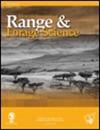Implications of the breakdown in the indigenous knowledge system for rangeland management and policy: a case study from the Eastern Cape in South Africa
IF 1.9
4区 环境科学与生态学
Q3 ECOLOGY
引用次数: 2
Abstract
Communal rangelands in South Africa are generally perceived as overgrazed owing to complexities in their histories and collective utilisation which often leads to improper management. A suitable solution has not been found in land management policies because local people’s contexts and their indigenous knowledge are ignored. Hence, this paper is aimed at (i) assessing the role indigenous knowledge can play in communal rangeland management, (ii) exploring working solutions to incorporate indigenous knowledge into effective communal rangeland management and land use policies, (iii) assessing mechanisms for generational transfer of indigenous knowledge. Findings from the Participatory Geographic Information System (PGIS) and Focus Group Discussion, conducted with Cata and Guquka villages in the Eastern Cape province were synthesised. This revealed that communal farmers have in-depth knowledge of their communal land, past and present rangeland management strategies and changes in rangeland condition. However, there is breakdown in the indigenous knowledge system whereby this knowledge is not being transferred and translated into good rangeland management practice, owing to the ageing population of communal farmers, limited youth involvement in livestock farming and limited access to extension services. This suggests a need for new policy approaches that would include participation of local people in policy planning and development.土著知识系统崩溃对牧场管理和政策的影响:来自南非东开普省的个案研究
南非的公共牧场由于其历史和集体利用的复杂性,通常被认为是过度放牧,这往往导致管理不当。在土地管理政策中没有找到合适的解决办法,因为当地人民的背景和他们的土著知识被忽视了。因此,本文旨在(i)评估土著知识在公共牧场管理中可以发挥的作用,(ii)探索将土著知识纳入有效的公共牧场管理和土地使用政策的工作解决方案,(iii)评估土著知识代际转移的机制。本文综合了参与式地理信息系统(PGIS)和焦点小组讨论的结果,这些讨论是在东开普省的卡塔村和古卡村进行的。这表明,社区农民对他们的公共土地、过去和现在的牧场管理策略以及牧场状况的变化有深入的了解。然而,由于社区农民人口老龄化、青年参与牲畜养殖有限以及获得推广服务的机会有限,土著知识体系出现了崩溃,这些知识没有被转移并转化为良好的牧场管理做法。这表明需要采取新的政策办法,其中包括让当地人民参与政策规划和发展。
本文章由计算机程序翻译,如有差异,请以英文原文为准。
求助全文
约1分钟内获得全文
求助全文
来源期刊

African Journal of Range & Forage Science
ECOLOGY-ENVIRONMENTAL SCIENCES
CiteScore
4.00
自引率
14.30%
发文量
35
审稿时长
>12 weeks
期刊介绍:
The African Journal of Range & Forage Science is the leading rangeland and pastoral journal in Africa. The Journal is dedicated to publishing quality original material that advances rangeland ecology and pasture management. The journal aims to publish research of international importance from any region, but as an African journal, we are particularly interested in research from Africa and relevant to the continent. The Journal promotes both science and its application and authors are encouraged to explicitly identify the practical implications of their work. Peer-reviewed research papers and research notes deal primarily with all aspects of rangeland and pasture ecology and management, including the ecophysiology and biogeochemistry of rangelands and pastures, terrestrial plant–herbivore interactions (both domestic and wild), rangeland assessment and monitoring, effects of climate change on rangelands, rangeland and pasture management, rangeland rehabilitation, ecosystem services in support of production, conservation and biodiversity goals, and the identification and development of intensive and semi-intensive pasture and forage resources to meet livestock production needs. Articles highlighting transdisciplinary linkages among biophysical and social sciences that support management, policy and societal values are particularly encouraged. The Journal includes relevant book reviews and invited perspectives that contribute to the development of range and forage science. Letters to the editor that debate issues raised in the Journal are acceptable. The African Journal of Range & Forage Science is the official journal of the Grassland Society of Southern Africa.
 求助内容:
求助内容: 应助结果提醒方式:
应助结果提醒方式:


